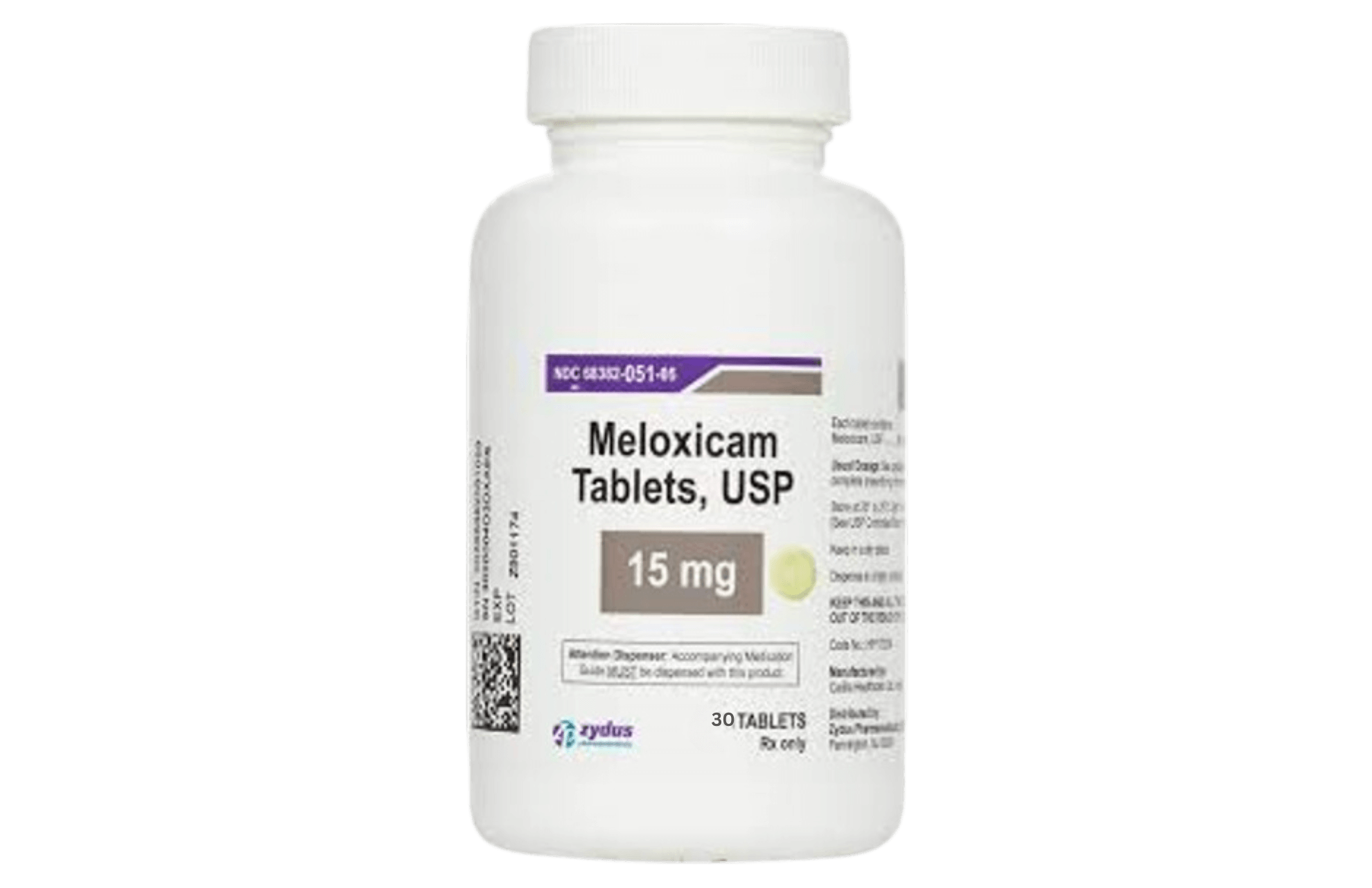Mobic / Meloxicam (
generic name: meloxicam) is a prescription
nonsteroidal anti-inflammatory drug (NSAID) used to treat
pain and
inflammation associated with arthritis. It is commonly prescribed for conditions such as
osteoarthritis (OA),
rheumatoid arthritis (RA), and
juvenile rheumatoid arthritis (JRA) in children aged
2 years and older. This medication helps reduce joint pain, stiffness, and swelling, improving overall mobility in patients with chronic inflammatory conditions.
Mobic can also be prescribed
off-label for the treatment of
dental or post-surgical pain. In addition to the above conditions, meloxicam has also been studied in the treatment of
neuropathic pain.
Meloxicam belongs to the
oxicam subclass of NSAIDs. It works by
blocking cyclooxygenase (COX-1 and COX-2) enzymes, which produce prostaglandins, the chemical messengers that cause pain, swelling, and inflammation in the body. By reducing prostaglandin production,
Mobic helps relieve arthritis symptoms while minimizing gastrointestinal irritation compared to some other NSAIDs. However, long-term use still carries risks, including cardiovascular and gastrointestinal complications.
Mobic is classified as a
selective NSAID, meaning it primarily inhibits COX-2, which is
more involved in inflammation, while sparing COX-1, which plays a protective role in the stomach lining. This selectivity may result in a
lower risk of stomach ulcers and bleeding compared to non-selective NSAIDs, though the risk is not eliminated entirely.
Dosage
Mobic should be taken orally with water, and it may be taken with or without food. It’s important to use the lowest effective dose for the shortest duration consistent with treatment goals. If a dose is missed, take it as soon as remembered unless it’s less than 3 hours before the next dose, in which cse the dose should be skipped. Do not double-dose to catch up.
Storage
Store Mobic at room temperature not higher than 25ºC, away from moisture and heat. Mobic is a very strong analgesic so it is essential to keep the medication out of reach of children.
Get more advice about safe drug storage
Frequently Asked Questions About Mobic
Can I take Mobic if I’m pregnant?
Mobic is not recommended during the third trimester of pregnancy due to potential risks to the fetus. If you are pregnant or planning to become pregnant, consult your doctor before starting Mobic.
How long does it take for Mobic to work?
Mobic does not provide immediate pain relief. While some patients notice improvement within a few days, it may take two weeks for the full effects to be felt. This is because meloxicam gradually reduces inflammation rather than acting as a rapid painkiller. To achieve the best results, it should be taken consistently at the prescribed dose. If no improvement is seen after two weeks, a healthcare provider should be consulted to assess whether the treatment plan needs adjustment.
Is meloxicam stronger than ibuprofen?
Meloxicam is considered a stronger NSAID than ibuprofen because it selectively inhibits COX-2, reducing inflammation with potentially fewer stomach-related side effects. However, ibuprofen has a faster onset, making it more effective for short-term pain relief, while meloxicam is preferred for long-term inflammation control. The choice between these medications depends on the patient’s condition, medical history, and risk factors. A doctor can determine which NSAID is most appropriate.
This text is for informational purposes only. Please consult a doctor or pharmacist before using any medication.
Read the information leaflet that comes with the medication.
If a sudden allergic reaction (anaphylaxis) occurs after taking Mobic, with symptoms like swelling of the face, tongue, or throat making it difficult to breathe or swallow, or there is wheezing, hives, rash, blistering, or peeling of the skin, call a doctor or 911 right away, or go to an emergency room immediately.
Most people who use Mobic do not experience any adverse side effects. Doctors prescribe this medication because they assess the benefits of such treatment outweigh any likely unwanted effects.
Some of the side effects that have been reported include:
- Nervous reaactions such as headaches, dizziness, spinning sensation, trouble sleeping, drowsiness.
- Stomach problems such as indigestion (stomach upset), heartburn/reflux, nausea, vomiting, burping or passing more wind than usual, cramps, pain, constipation, loose stools (diarrhoea).
- Allergic reactions
- Fluid retention in lower body or swelling of hands, ankles or feet (edema)
- Fatigue
- Flu-like symptoms, with runny or blocked nose, cough, sore mouth or throat, discomfort when swallowing
There can also be more serious side effects, such as signs of a stroke, with weakness on one side of the body, slurring of speech or loss of vision. In such a case, refer immediately to a doctor or go to an emergency healthcare center.
Not all side effects are listed here. If these or other unlisted symptoms persist or worsen, consult a healthcare provider or pharmacist.
Mobic is FDA-approved for the treatment of:
- Osteoarthritis (OA): A degenerative joint disease causing cartilage breakdown, leading to joint pain, stiffness, and swelling.
- Rheumatoid Arthritis (RA): An autoimmune disorder that results in chronic joint inflammation, which can cause pain and deformity over time.
- Juvenile Rheumatoid Arthritis (JRA): A form of arthritis affecting children, leading to joint swelling, reduced mobility, and pain.













